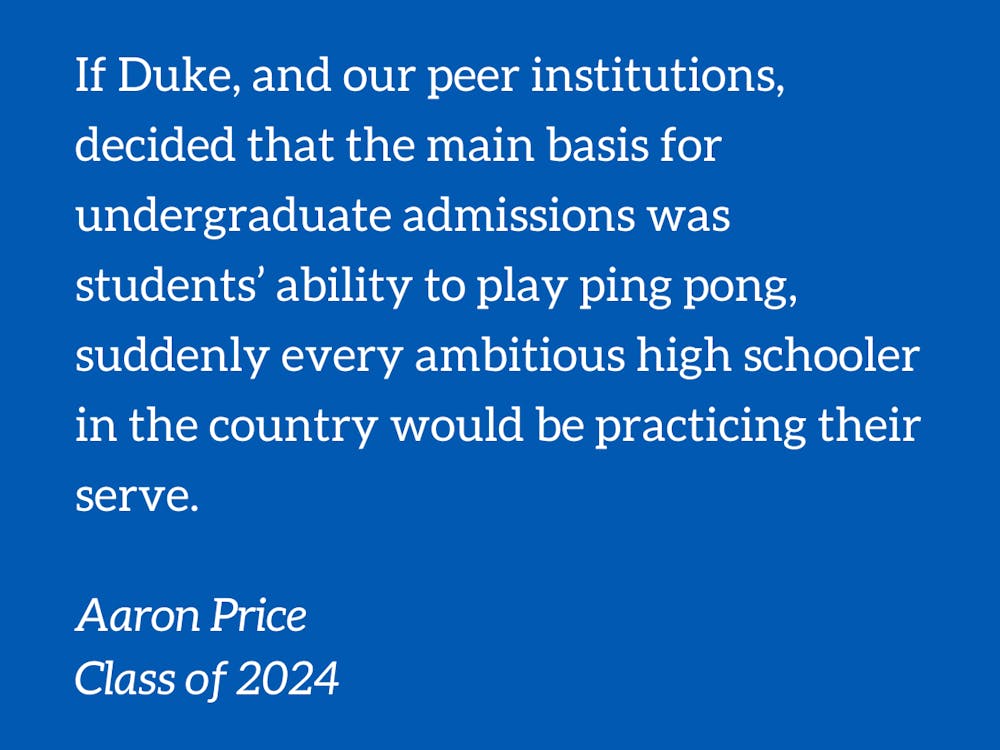I was in ninth grade when my grandfather told me I should found a non-profit. His pitch wasn’t that this would be a way to positively change the world, but rather help me get into an elite college. Why a non-profit? Because top universities said they value community service in their admission decisions. So, I started a non-profit. We began collecting used school supplies destined for the landfill and sent them to grade schools in developing countries. We completed this process once, realized shipping internationally was incredibly expensive, and never sent another package. Then, I moved onto other pursuits that would look good on a resume: academic publishing.
This experience of hopping between “sexy” extracurriculars isn’t unique. Motivated high schoolers, overpaid private counselors and parents endlessly craft teens’ experiences to make compelling college admissions resumes. Consider this thought experiment — if Duke, and our peer institutions, decided that the main basis for undergraduate admissions was students’ ability to play ping pong, suddenly every ambitious high schooler in the country would be practicing their serve. I know this is a silly hypothetical. But, it magnifies the point that these admissions offices aren’t considering: Admissions at elite universities carry tremendous weight, profoundly influencing the skills, traits and behaviors valued by the most promising youth.
If elite college admissions are so important in shaping high schooler’s focus, what exactly are we encouraging students to value? Well, thanks to FERPA, which allows us to get our hands on actual Duke admissions files, we can see exactly how Duke measures students. It reveals applicants are scored in six different categories: Curriculum Strength, Academics, Recommendations, Essays, Extracurriculars and Test Scores. This lines up exactly with the advice my college advisor gave me as I started high school: “Take the hardest classes you can, get straight A’s and crush the ACT.” These words pushed me to take college calculus courses after school, study over the summer for the ACT and always do the extra credit assignments. I was taught that if I was obedient, never messed up and delayed gratification, I would succeed.
And this doesn’t just seep into student’s individual actions, but also the pedagogical choices of their secondary schools. Want proof? The most expensive high schools in the country advertise themselves as college preparatory, attracting many students based on how many of their seniors go to Ivy+ schools each year. Universities like Duke place such an emphasis on testing, GPA and high school “rigor” (think AP’s here) that student creativity is squashed. High schools try to cram as much information as possible into each day so we score high on standardized tests. Students aren’t praised for asking thoughtful questions but rather for providing the “right” answer. We are taught that answering correctly scores well on the SAT and questions in class take away from time that could be used for getting through new course material. Regurgitation is good. Curiosity and challenging the norm are bad.
And what’s the result of all of this? Students graduate from top colleges as experts at obedience, risk-aversion and adhering to the status quo — traits counter to the innovative disruptors the world needs us to be. Now there’s a plethora of reasons that corporations, universities and governments should all be upset by this reality: unfit workers, lack of alumni donations and threat to democracy. But, here’s why you, dear reader, should care. These admission criteria are stunting your potential fulfillment and impact on the world.
I feel like I have a conversation with a different peer everyday in which they express to me that they have no idea what they want to pursue after graduation. I think this stems from our hyperfixation on grades and consumption of knowledge, causing a lack of time for true curiosity. Not to mention our raging campus perfectionism that says a first job must pay six figures or you suck. But, here’s the issue: we get these high paying jobs and then are miserable doing them. I’ve chatted with many friends who have come back from the most prestigious internships this summer and I’ve yet to find one who enjoyed their work. This isn’t the fault of our students but rather our admission requirements.
So what should elite colleges look for in their admissions processes? I think it’s the traits of intentional and critical thinking innovators — risk taking, challenging the status quo and curiosity. These traits would foster students’ abilities to thoughtfully consider the impact they hope to make on the world and provide them with the abilities to take action on these goals.
My little sister is starting the college application process soon. She’s seen the amazing people I’ve gotten to befriend at Duke and would love to go to a similar school. My hope is that she won’t have to play the college admissions game that we all endured. Rather, schools will see the benefit of rewarding students striving for growth over grades, giving her the freedom to explore her curiosity and think critically about how she hopes to shake up the world. But just in case, she’ll be practicing her ping pong serve.
Aaron Price is a Trinity senior. His column typically runs on alternate Tuesdays.
Get The Chronicle straight to your inbox
Sign up for our weekly newsletter. Cancel at any time.

